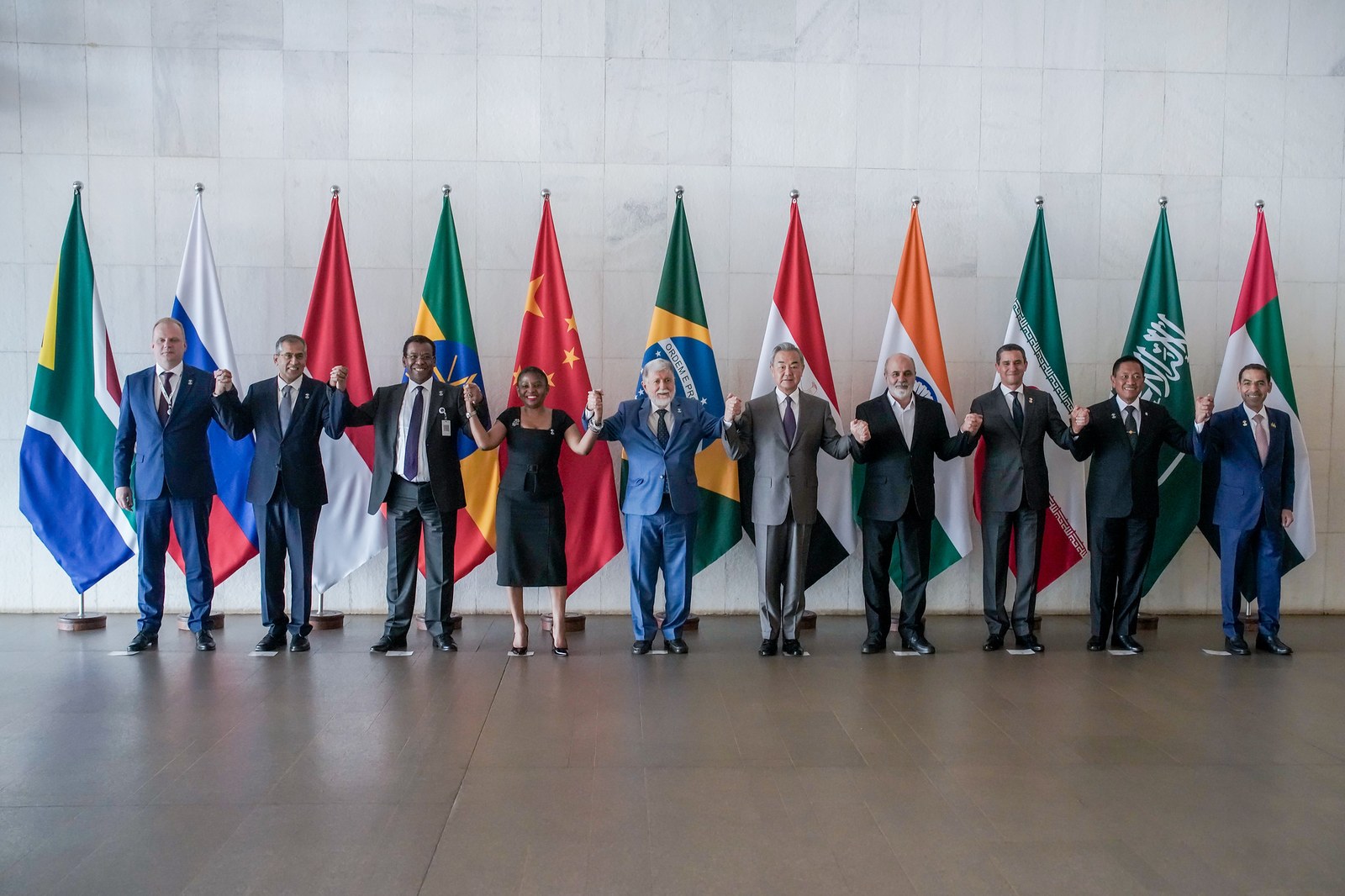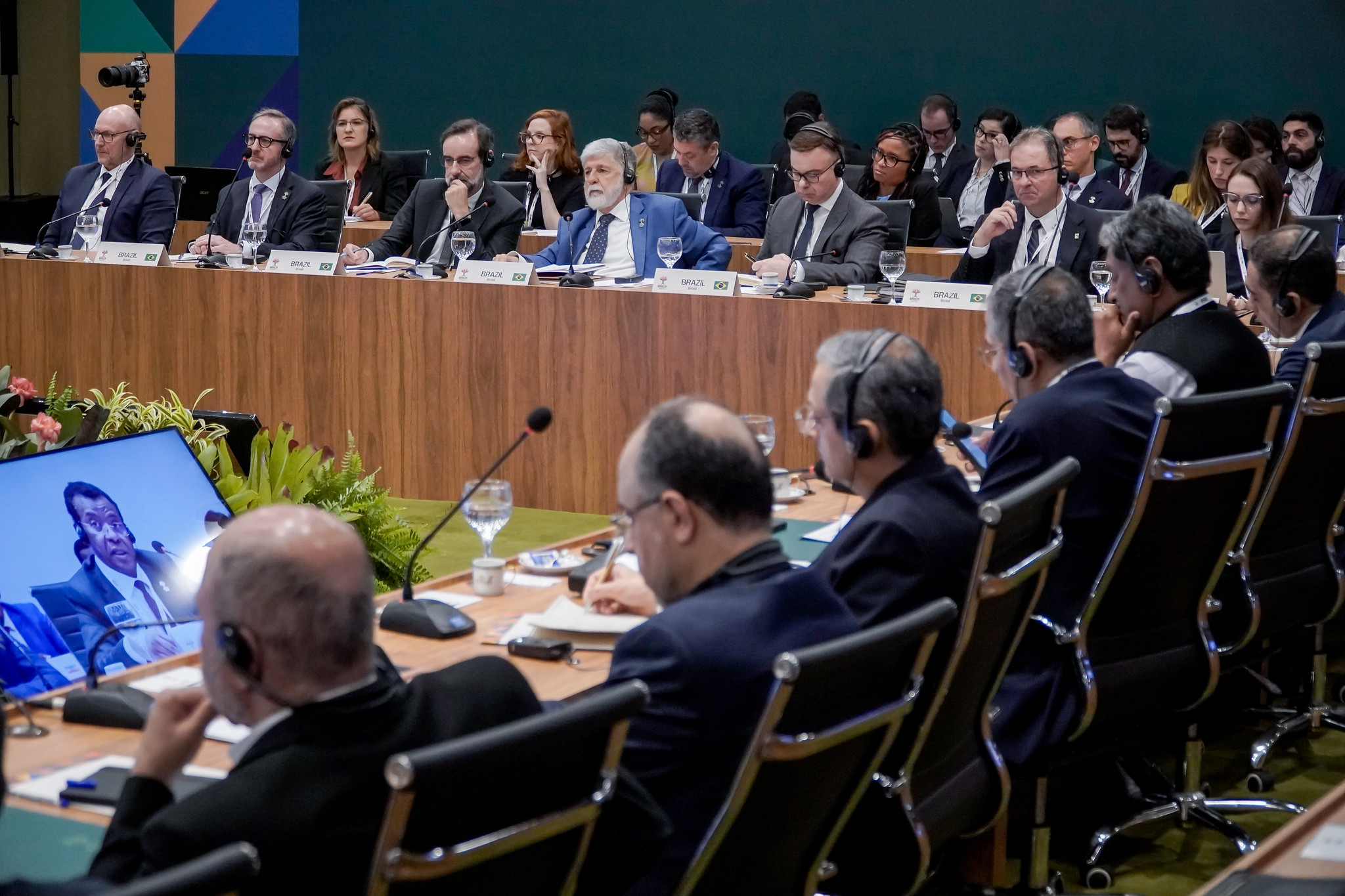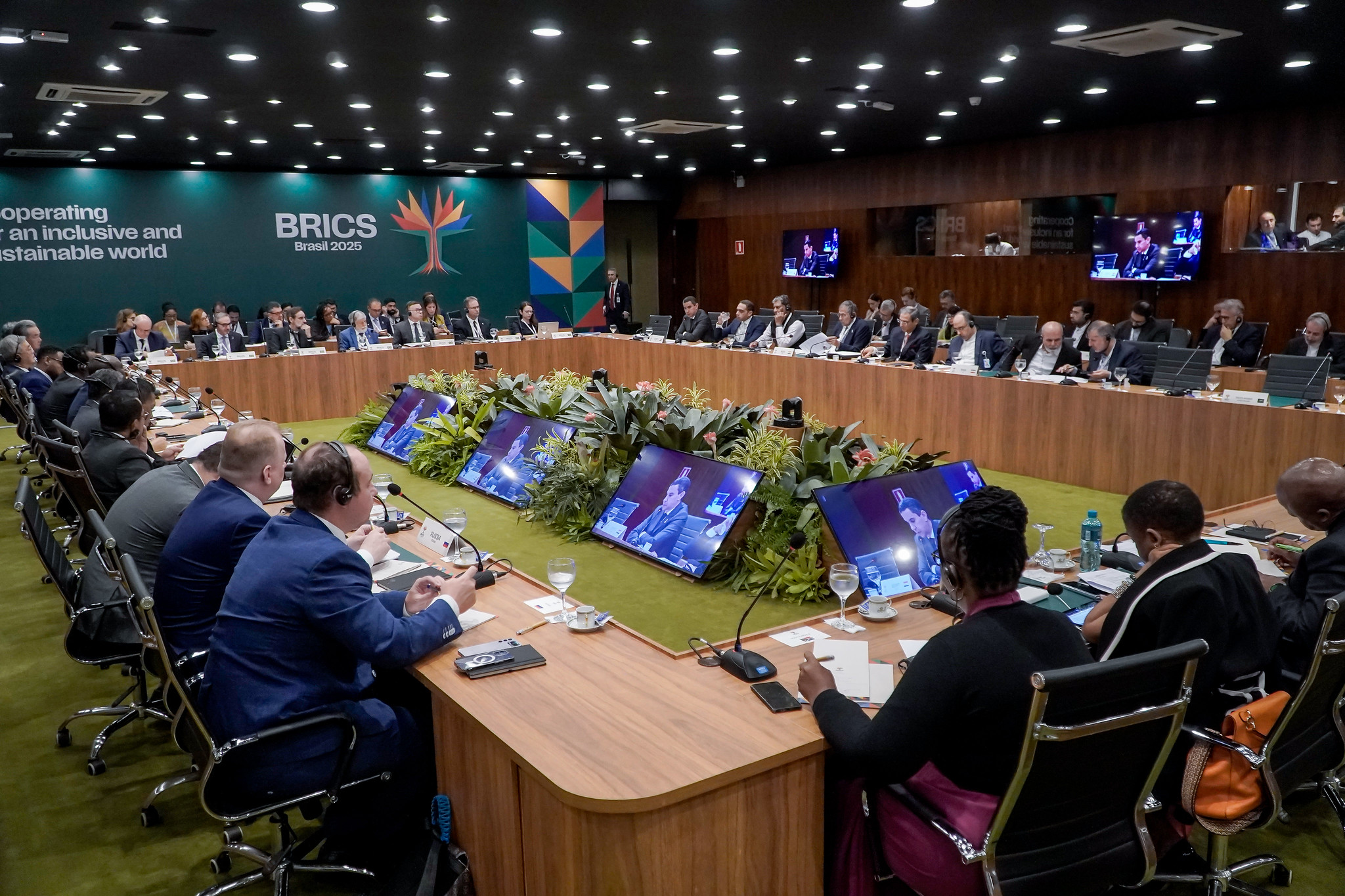BRICS aligns positions and commitments on multilateralism, global peace, and tech security
BRICS national security advisers reaffirmed their commitment to global cooperation, a multipolar order, and diplomatic conflict resolution. Discussions held during the meeting in Brasilia also focused on countering cyber threats. These issues will be presented at July’s upcoming BRICS Leaders' Summit in Rio de Janeiro.

By Leandro Molina / leandro.molina@presidencia.gov.br
As part of its BRICS presidency, Brasil hosted the group's meeting of national security advisers, a high-level forum that has been held since 2009 and brings together the main authorities responsible for overseeing strategic issues in the member countries. Held at the Ministry of Foreign Affairs headquarters in Brasilia, the meeting brought together the BRICS countries’ authorities responsible for the defense and foreign policy agendas at a time considered critical for international security. The event, part of a calendar of some 20 ministerial meetings planned during Brasil's BRICS presidency in 2025, focused on discussing new security realities and the group's role in promoting peace and multilateralism.
Ambassador Celso Amorim, Chief Adviser for Institutional Security to Brasil’s Presidency and the country’s representative at the meeting, opened with a speech revisiting BRICS’ trajectory as an alternative to unipolar dominance. “During Brasil’s first BRICS Presidency in 2010, we welcomed the founding leaders in this very building. The world was different then, but we already foresaw the need for a multipolar, equitable, and democratic global order,” he recalled.
Amorim emphasized BRICS’ recent expansion as proof of its vitality: “We seek neither a new Cold War nor the perpetuation of unipolarity. Our path is effective multilateralism, anchored in international law,” he argued. His remarks reflected the shared view among BRICS members that the world stands at a historic crossroads marked by escalating geopolitical rivalries, wars, and internal conflicts. Armed conflict casualties have surged in recent years, alongside humanitarian crises demanding BRICS’ heightened attention.

Data presented revealed global military spending hit a record USD 2.4 trillion in 2024, while resources to tackle hunger, climate change, and pandemic preparedness remain inadequate. “We witness the erosion of decades-old state-to-state norms. Trade wars, unilateral sanctions, and the decline of peaceful dispute mechanisms pose existential risks,” Amorim warned.
The conflicts in Ukraine and the Middle East dominated the discussions. Brasil’s adviser reiterated the importance of the China-Brasil Common Understandings for a peaceful Ukraine resolution—a 2023 joint document advocating conditions for a comprehensive ceasefire. “We welcome recent peace initiatives and believe these discussions must be multilateralized when opportune,” he said, referencing the Group of Friends for Peace established at the UN last September. On Gaza, participants unanimously condemned violations of international humanitarian law, decrying blocked aid and indiscriminate deaths as “an affront to humanity’s conscience—one BRICS cannot ignore.”
Transformations in technological security emerged as another priority. Panelists reiterated that the advancement of artificial intelligence in weapons systems and the proliferation of cyber threats demand a coordinated response. “The potential of AI for human progress is immense, but its uncontrolled military use poses a threat to civilization. Human oversight of lethal autonomous systems is non-negotiable,” said Amorim. In this context, the ongoing negotiation of a Memorandum of Understanding among BRICS countries to strengthen cooperation among their cyber emergency response teams is particularly relevant.
The role of BRICS countries in conflict mediation
Another session of the meeting, entitled “The Role of the BRICS Countries in Conflict Prevention and Mediation”, deepened the debate on how the group can contribute to the peaceful resolution of international disputes. Celso Amorim emphasized that, in a new multipolar world, mediation and conflict prevention are no longer the exclusive responsibility of the great powers. “Countries from the Global South, such as the BRICS members, have repeatedly demonstrated that they possess the necessary credentials to contribute to peaceful dispute resolution efforts,” he said.
Ambassador Amorim recalled that Brasil's international activities are independent and not aligned with any bloc. Quoting the diplomat San Tiago Dantas—whose name graces the room where the meeting took place—he said, “He argued that Brasil could not be a mere spectator in the mending of nations. This is the ideal that inspires us to act beyond our immediate circumstances.”
The ambassador also listed Brasil's long tradition in UN peacekeeping missions, from the first peacekeeping force in Suez in 1956 to the current UN Mission in the Democratic Republic of Congo, commanded by a Brazilian general. “For 13 years, Brasil was in military command of the mission in Haiti,” he recalled.
According to the ambassador, peace in South America underpins Brasil’s global engagement. “One cannot focus on other crises when there is no peace in its own neighborhood. We prioritize integration in South America because we believe integration is a vector for peace.” He noted that Brasil has peacefully resolved its border disputes with ten countries, relying on negotiation and, in several cases, international arbitration.
In recent years, Brasil has been active in mediating regional conflicts. During President Luiz Inácio Lula da Silva's first two years in office, the country engaged in talks with other Latin American countries. The national security adviser also highlighted Brasil’s efforts to consolidate Latin America as a zone of peace. The region is a nuclear-weapon-free zone, as established by the 1967 Treaty of Tlatelolco. At Brasil’s initiative, the South Atlantic Peace and Cooperation Zone was created in 1986 to promote cooperation among 24 South American and African countries.
Global challenges and the future of BRICS
Ambassador Celso Amorim emphasized that Brasil’s actions are not limited to its geographical region. He noted that in the first decade of this century, the country took part in the Middle East peace process, including participation in the Annapolis Conference. Alongside Türkiye, Brasil also worked to promote a peaceful resolution to the issue of Iran’s nuclear program. With the matter back on the international agenda, the ambassador renewed his call for a negotiated solution.
On the war in Ukraine, Amorim reiterated Brasil’s commitment to a diplomatic solution. He observed that since President Lula returned to office, the country has been actively contributing to a peaceful resolution, with Brasil's position summarized in the Brasil–China Six-Point Common Understanding. This framework advocates for direct dialogue between the parties, de-escalation of the conflict, and the rejection of attacks on nuclear facilities. “Given their geopolitical weight, the BRICS countries will continue to be called upon to mediate conflicts. It would be very interesting if we could launch, within the framework of the group, a discussion on negotiation techniques and best practices,” he suggested.
The meeting reinforced BRICS' commitment to the United Nations Charter and the principles of international law. The group opposes the politicization of multilateral bodies and advocates for the expansion of conflict mediation mechanisms that include the perspectives of developing countries. The justification lies in their extensive experience in negotiating ceasefires, disarmament, and humanitarian operations. This expertise should be put to better use, according to the negotiators.
The National Security Advisers' meeting in Brasilia serves as preparation for the BRICS Leaders' Summit, scheduled for July 6 and 7 in Rio de Janeiro. The participants assessed that the Brazilian presidency has made progress on its priority agenda of positioning the group as a key player in global governance. At the end of the meeting, Amorim quoted the words of the late Pope Francis from his last Easter message: “I appeal to all those in positions of political responsibility in our world not to yield to the logic of fear, which only leads to isolation from others, but rather to use the resources available to help the needy, to fight hunger, and to encourage initiatives that promote development. These are the 'weapons' of peace: weapons that build the future, instead of sowing seeds of death!”
The speech captured the essence of a meeting that aimed, above all, to affirm the BRICS as a constructive force in a world facing pivotal crossroads. In doing so, the Brazilian presidency reaffirmed BRICS' commitment to a fair and inclusive international order, grounded in respect for multilateralism and the relentless pursuit of peace.

English version: Mary Aune
Proofreading by Enrique Villamil